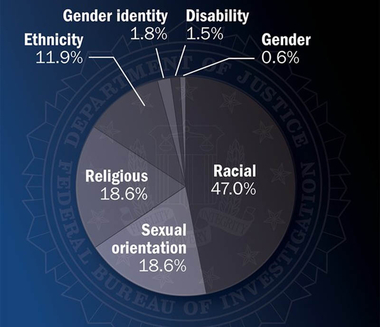Few law enforcement agencies in The Gayly’s area report hate crimes

By Rob Howard
Associate Editor
Today, the Associated Press released a report on the underreporting of hate crime nationally. Non-reporting by cities, counties, and other agencies such as universities is a serious problem because it prevents the focus on hate crimes as a law enforcement effort that needs to be undertaken.
Read the national story about hate crime reporting in The Gayly’s post here. The Gayly took the opportunity to look at hate crime reporting, particularly as it relates to hate crimes against LGBTQ persons, in The Gayly’s region – Arkansas, Kansas, Missouri, Oklahoma, and Texas.
The first, and most obvious problem, is that very few agencies in each of our states are reporting at all. In Arkansas, there are 270 reporting agencies; five of them reported for 2014, the most recent month that data is available for, and there were only eight total incidents reported.
In Kansas, only 37 of the 359 reporting agencies made a report, with 73 incidents reported. In Missouri, only three percent of agencies reported 76 incidents. Oklahoma had only 18 agencies reporting out of 333, and only 33 incidents were reported. The entire state of Texas (information isn’t available for The Gayly’s distribution area in Northwest Texas) only 57 agencies reported 145 incidents. Texas’ population is nearly 27 million.
The Hate Crime Statistics Act, was passed by Congress in 1990, and required the attorney general to collect data "about crimes that manifest evidence of prejudice based on race, religion, sexual orientation, or ethnicity." It was amended in 1994 to include bias against people with disabilities and again in 2009 to include information about crimes based on gender or gender identity, according to an AP report.
The AP reports that, “The FBI's training manual says the collection and publication of hate crimes results in ‘greater awareness and understanding of the true dimensions of the problem nationwide.’ That provides law enforcement with a greater ability to target money, training or staff where they will be most effective. Community groups say a comprehensive tally of hate crimes would provide a truer picture of the extent of bias in the U.S., prompt lawmakers to address the problem and help law enforcement agencies build trust with minority communities.”
The most hate crimes reported – 47 percent - are based on racial bias, but sexual orientation, at 18.6 percent, is tied for second place with religious bigotry. Gender identity accounts for 1.8 percent of the hate crimes reported.
In The Gayly’s region, not only is reporting limited, but the number of incidents reported are disturbingly small, based on the experience of minority communities across the country. Hate crimes in our area reported for sexual orientation and gender identity are very small.
In Arkansas, out of eight incidents reported in 2014, none were for sexual orientation or gender identity. In Kansas, out of 73 reports, 10 were for sexual orientation, none for gender identity. Wichita and Lawrence reported the majority of the sexual orientation incidents, suggesting that both cities have robust attention to hate crimes in place.
In Missouri, out of 47 reports, 13 were for sexual orientation hate crimes and two were for gender identity. Kansas City reported 31, or 67 percent, of the state’s hate crimes, indicating Kansas City, MO is doing a good job of tracking these crimes.
Out of Oklahoma’s 33 incidents, 10 were for sexual orientation related crimes, and none for gender identity. Oklahoma City makes reports to the FBI, Tulsa did not in 2014. Out of Texas’ 145 incidents, 38 were related to sexual orientation, but only one to gender identity. Cities that appear to be making a diligent effort in reporting include Austin (although it reported no racially motivated incidents), Dallas, Houston and San Antonio.
Many states have hate crime laws on the books, but most do not include both sexual orientation and gender identity. The Federal government has an inclusive hate crime law in place. Persons who attempt to report hate crimes and are rebuffed by their local law enforcement agencies, can file a complaint with the FBI.
The Gayly – June 5, 2016 @ 3:40 p.m.





